Is Franklin Street dying or just different? What’s fueling Chapel Hill street’s changes?
On the Thursday night before Linda’s closed down, 88 people stood in line for cheese fries and whatever beer remained undrunk — a collection of downhearted UNC alumni with gray hair and ruined nostalgia.
After 48 years, Chapel Hill’s shrine to drink specials and last-call pickup lines announced its unthinkable collapse this month, adding another old-guard favorite to Franklin Street’s casualty list — this one killed by dwindling receipts.
Inside the beloved bar hung with Christmas lights sat one UNC couple so devoted to Linda’s they could trace their matrimony back to one of its wooden booths that is still carved with initials from romances past.
”We literally did our marriage counseling here,” said Melinda Manning. “Over loaded cheese fries.”
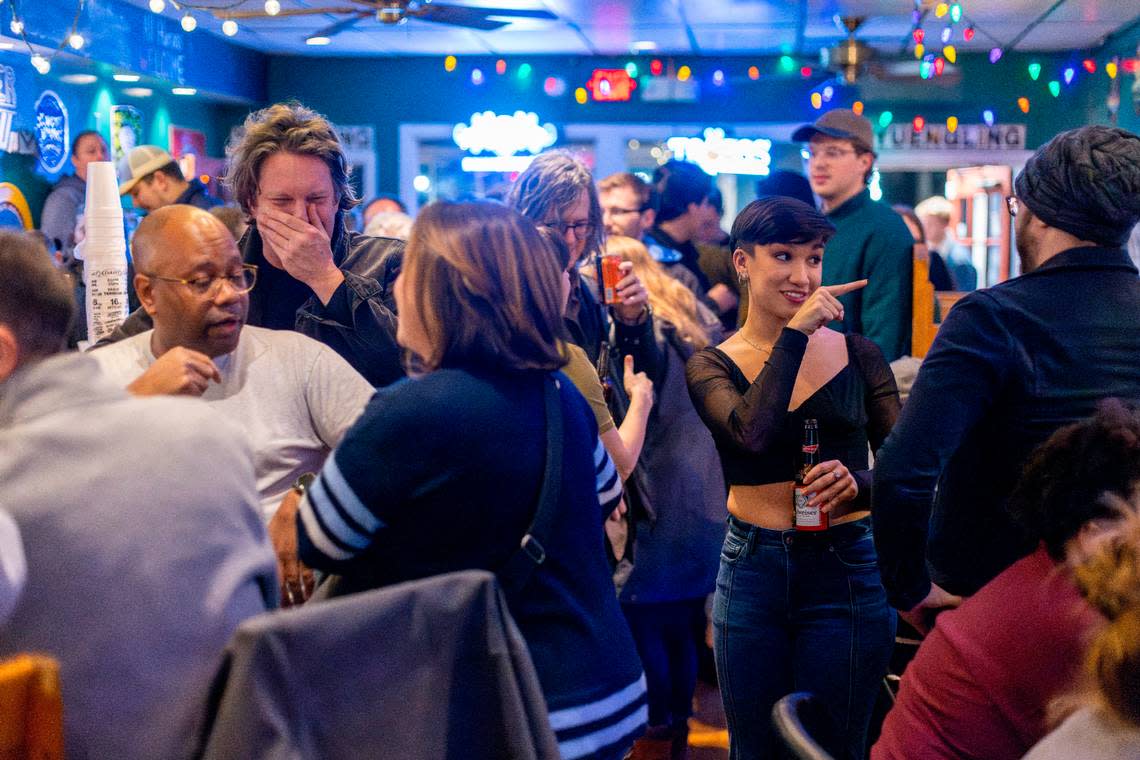
And outside on a picnic bench, longtime owner Chris Carini looked up Franklin Street to the empty storefronts, the chain restaurants and the near-total erasure of colorful Chapel Hill history. No Spanky’s. No Crook’s Corner. No Ye Old Waffle Shoppe.
He asked this grim question out loud:
“Where are the other three horsemen?”
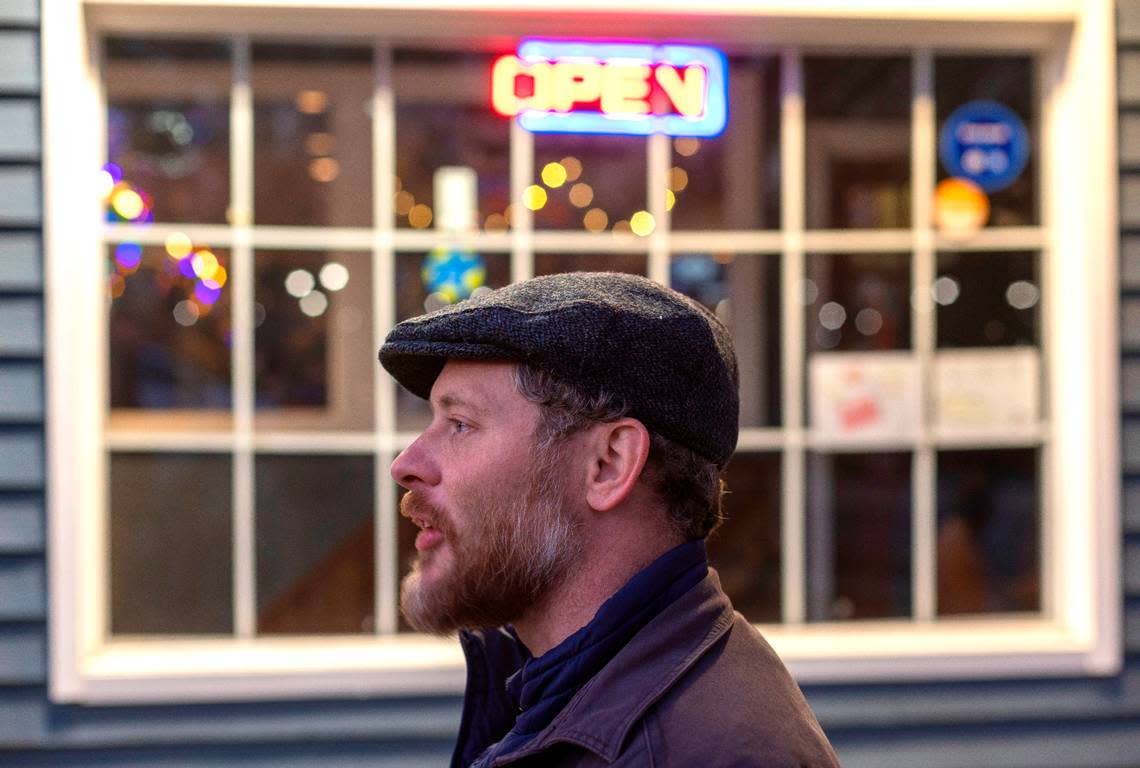
Historic street of the flagship campus
The laments grow louder over Franklin Street every time a fabled establishment shuts down, but those cries have risen to screaming since Linda’s departure. Even with the building’s namesake owner Linda Williams pledging to find a new owner, the question from aging alumni is no longer whether Franklin Street can survive, but whether it is already dead.
Dead, alive or merely staging a dramatic wardrobe change, the historic street through North Carolina’s flagship campus looks and feels nothing like it did 10 years ago, let alone 20 — a turn-off for generations of alumni holding on to its faded identity.
“You used to talk about Chapel Hill, and it was a selling point that it wasn’t corporate,” said Alex Karsten, class of 2014. “You go to other places and there’s a Target, a McDonald’s.
“Now, that’s Franklin Street.”
But to the mix of people there, Franklin Street owes its changing nature to a long list of complicated factors:
▪ the lingering business slowdown from the pandemic.
▪ changing tastes among college students.
▪ a scarcity of affordable housing around campus.
▪ a mandate for high-tech business growth and high-end restaurants to serve it.
▪ explosive growth in the Triangle that puts rival coffee houses and breweries all over the map.
Photo gallery: Take a look at Chapel Hill’s Franklin Street through the years
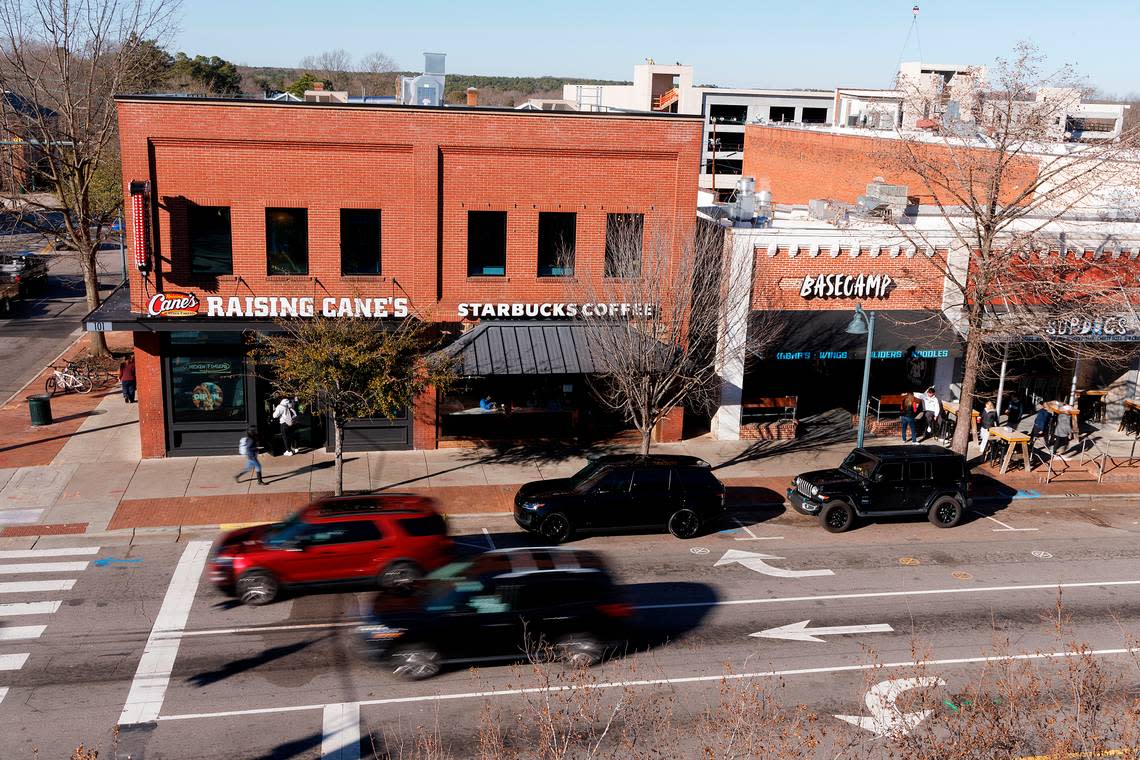
More than boomer nostalgia
The sadness and confusion over Franklin Street’s direction extends beyond yesterday’s student wanting youthful memories kept intact.
Some of the newer, more successful businesses along Franklin feel like Chapel Hill is busy pushing away local ownership with charm and character in favor of taller, sleeker and more affluent design.
The Purple Bowl, the popular health food eatery that serves acai smoothies and antioxidant bowls, will move farther down Franklin Street several blocks to the west to make way for the Longfellow project, a nine-story wet lab with office space and retail. Down at that end, funkier establishments along the lines of Al’s Burger Shack and Local 506 are still holding court.
That move comes as Chapel Hill and UNC build an “innovation district” to lure more tech and startup businesses, matching the Google office already on Franklin Street. The first phase involves 118,000 square feet on seven floors, giving California-based BioLabs space for science startups and Launch Chapel Hill room for its business venture lab accelerator — all terms that clash with Franklin Street’s funky past.
In a 2023 article, Governing magazine urged aging boomers to let go of the college-town vibe of their youth and embrace this sort of growth, nothing that coffee houses, breweries and used bookstores can now be found in the suburbs.
But it still stings at Purple Bowl, which is family owned and still quite new, spurred by the desire to bring acai bowls to a Franklin Street starving for an alternative to pizza and wings.
“The soul of the town has been lost,” said Taylor Gilland, Purple Bowl’s 32-year-old co-owner. “You have this charming college town with buildings that have been here 100 years. Now, it’s kind of disjointed, with buildings blocking out the sun. A lot of the older, independent restaurants that made Chapel Hill work, they’re being replaced. ... Maybe that’s change.”
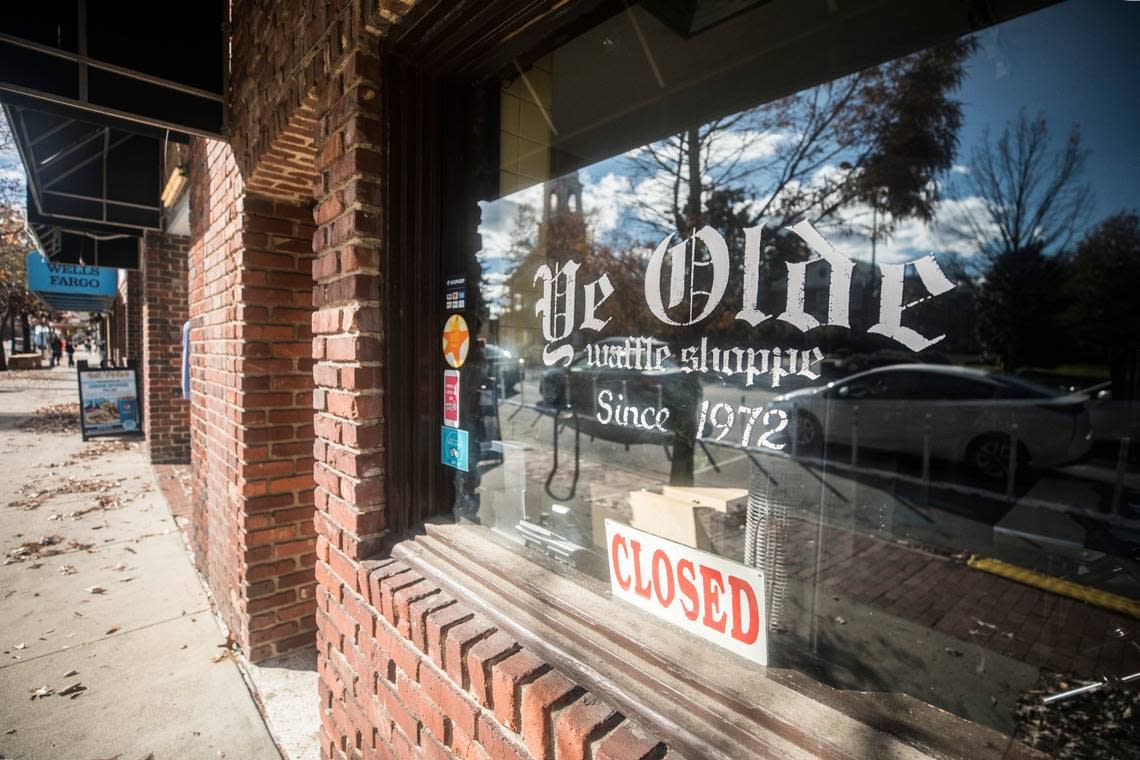
‘Entrepreneurial endeavors’
Alexander Julian grew up on the sidewalks of Franklin Street outside his father’s clothing store, later opening his own and finding fame as a designer — notably for the argyle-accentuated uniforms of the UNC men’s basketball team.
Few have seen more reinventions there: Julian can recall when Franklin Street boasted seven major men’s shops, making Chapel Hill a mecca for the collegiate style. His father once tried to get the 100 block made into a pedestrian mall — a makeover not too far from design changes Chapel Hill is still considering.
Now in his 70s, Julian remains bullish on Franklin Street’s future, and said he’s hoping for the Ackland Art Museum to expand gallery space in storefronts alongside high-end restaurants.
But none of this growth, he notes, is aimed at students.
“It’s aimed at the new influx of executive level and entrepreneurial endeavors that will be moving into Franklin Street,” he said.
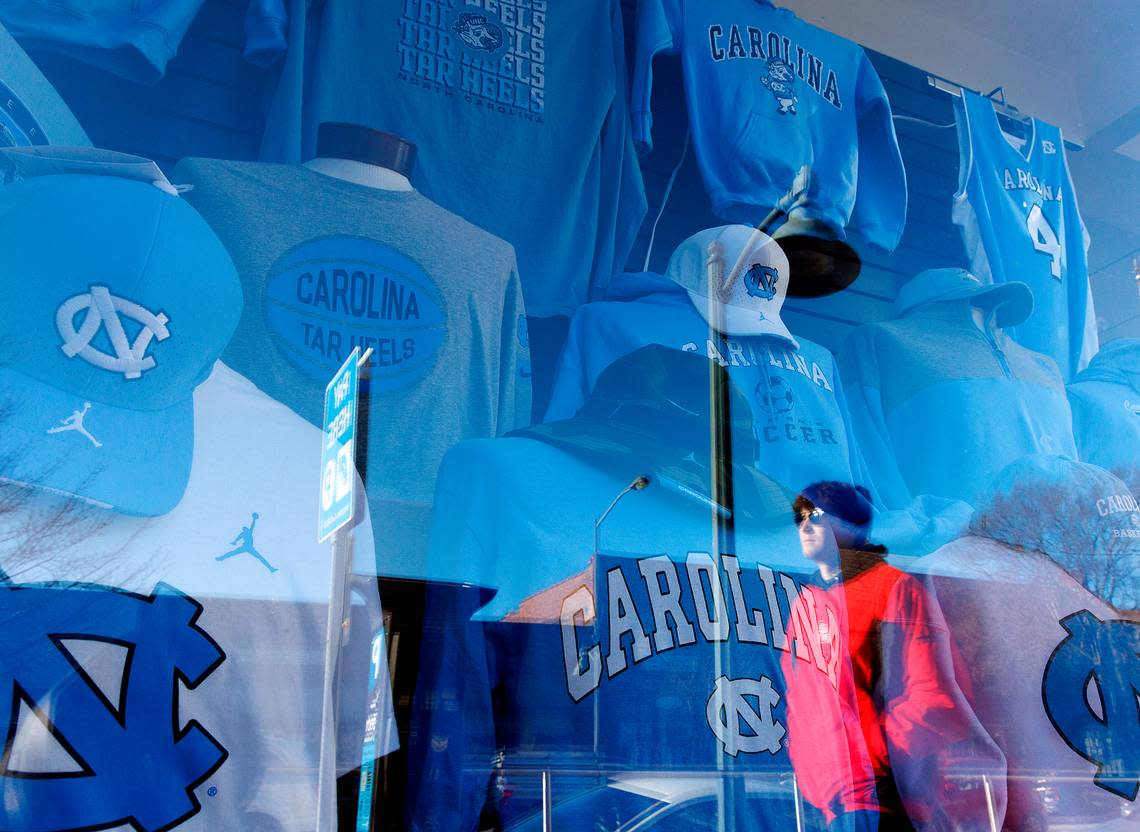
‘Old and played out’
A popular target for alumni criticism is Raising Cane’s, the two-story chicken finger chain restaurant that took up the spot once occupied by Spanky’s, a 40-year stalwart on the corner of Columbia Street.
With more than 700 franchises in all, Raising Cane’s had the means to not only renovate its Franklin Street property, but to buy the building. Still, it drew predictable boos from alumni and Chapel Hill natives who found nothing resembling character inside.
Students, meanwhile, immediately queued up in lines stretching out the door. The Daily Tar Heel reported one graduate student camping out to be first in line at its grand opening, and also wearing a chicken costume to celebrate.
“I feel like Franklin Street needed this,” senior Jaylen Harrell told the DTH at Raising Cane’s debut. “There isn’t too many spots to eat at — all the traditional spots are kind of getting old and played out.”
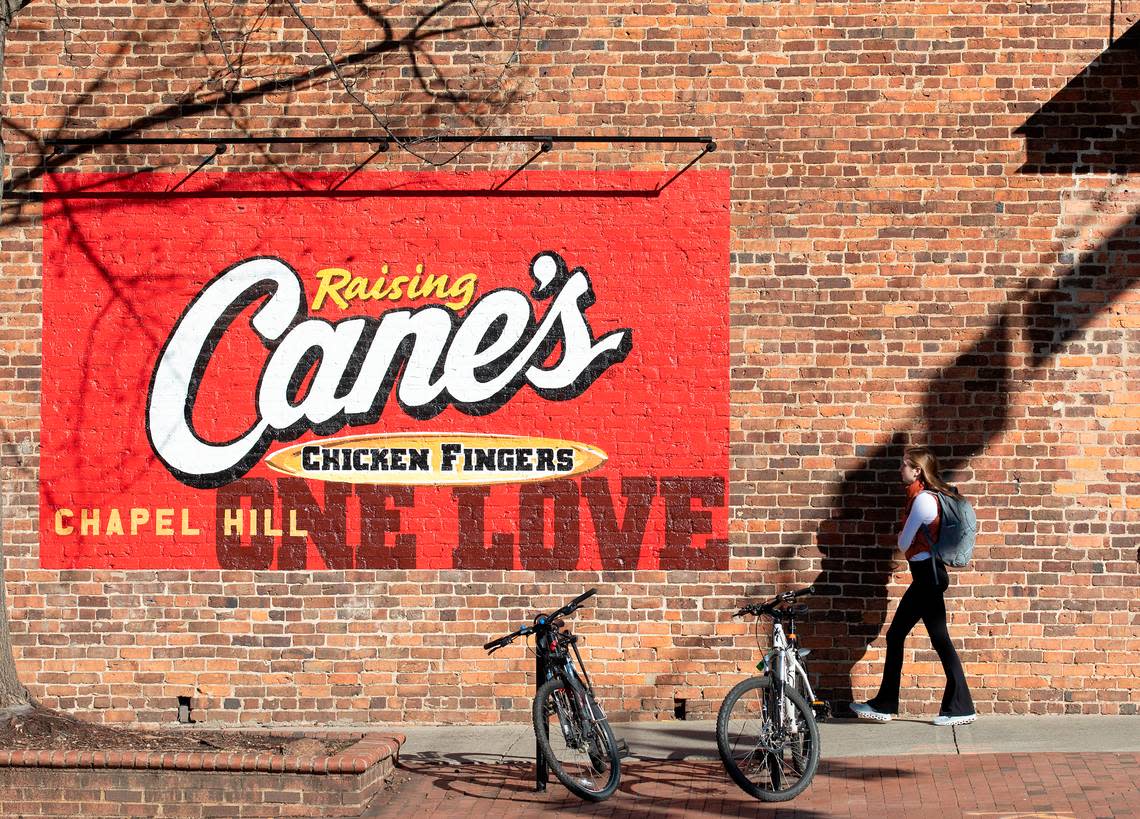
‘They don’t go out as much’
The trouble for Linda’s started during the pandemic, when Carini saw annual sales dip from $1.4 million to somewhere around $600,000.
Worries over COVID-19 and tight spaces took down Ye Olde Waffle Shoppe in 2020.
But even with restrictions lifted and sickness drastically reduced, the traffic never truly came back for Linda’s.

Carini launched a GoFundMe campaign late last year, but donors brought in roughly $35,000, far short of the $135,000 he sought. Shortly afterward, Carini realized that if he raised his prices by 30% and cut salaries by 20%, he would only make a dent in his debt.
To his thinking, the college student of 2024 differs vastly from those of 1994, making business on Franklin Street a dicier bet.
For one, he said, they don’t drink as much — a trend that started even before the pandemic losses. For another, they shun cheeseburgers for healthier fare, paving the way for the Purple Bowls of Franklin Street.
“Remember how awesome the ‘90s were?” Carini asked. “Nobody who’s 21 today knows anything about that. They grew up after 9/11 with their parents having their houses taken and with social media, which is a menace. So the thought becomes, how do you show these kids a good time?”
He joked that at least they aren’t throwing up in his sidewalk planters.
“They don’t go out as much. Well, they don’t go out on Franklin Street, because there’s not much here. ... We’re all on our (fricking) knees, and COVID put us there.”

‘You have to have a car’
The modern UNC student would dispute the idea of Franklin Street gasping out a death rattle, or that students post-COVID are hibernating with TikTok and THC gummies — a stereotype tossed around at Linda’s farewell.
But if you never ate Pepper’s Pizza while the kitchen blasted Archers of Loaf, you don’t miss it.
“To the people who graduated 10 to 20 years ago, it’s probably feeling like the end of the world, and I get it,” said Emmy Martin, editor of The Daily Tar Heel, whose office sits on the 100 block. “But I’m on Franklin Street right now, and people are walking up and down.”
An increasing worry that afflicted students far less in 1993 is the cost of housing off-campus, where most juniors, seniors and graduate students live.

The overall median rent in Chapel Hill stands at $1,418, according to the online tracker Apartment List. That figure represents a slight drop from last year’s prices. Rent Cafe places Chapel Hill’s cost-of-living at 9% higher than the state average.
Martin lives within walking distance of Franklin Street, but many of her friends drive from Carrboro and beyond.
“You have to have a car, or you have to rely on the buses,” she said. “You have to pay, and sometimes there’s no spaces. The friends I have a 10-minute drive from Franklin Street don’t go to Franklin Street.”
Chapel Hill has spent the past few years and tens of millions of dollars constructing a 1,100-space parking deck on nearby East Rosemary Street, but critics point to a lack of affordable housing anywhere around it.
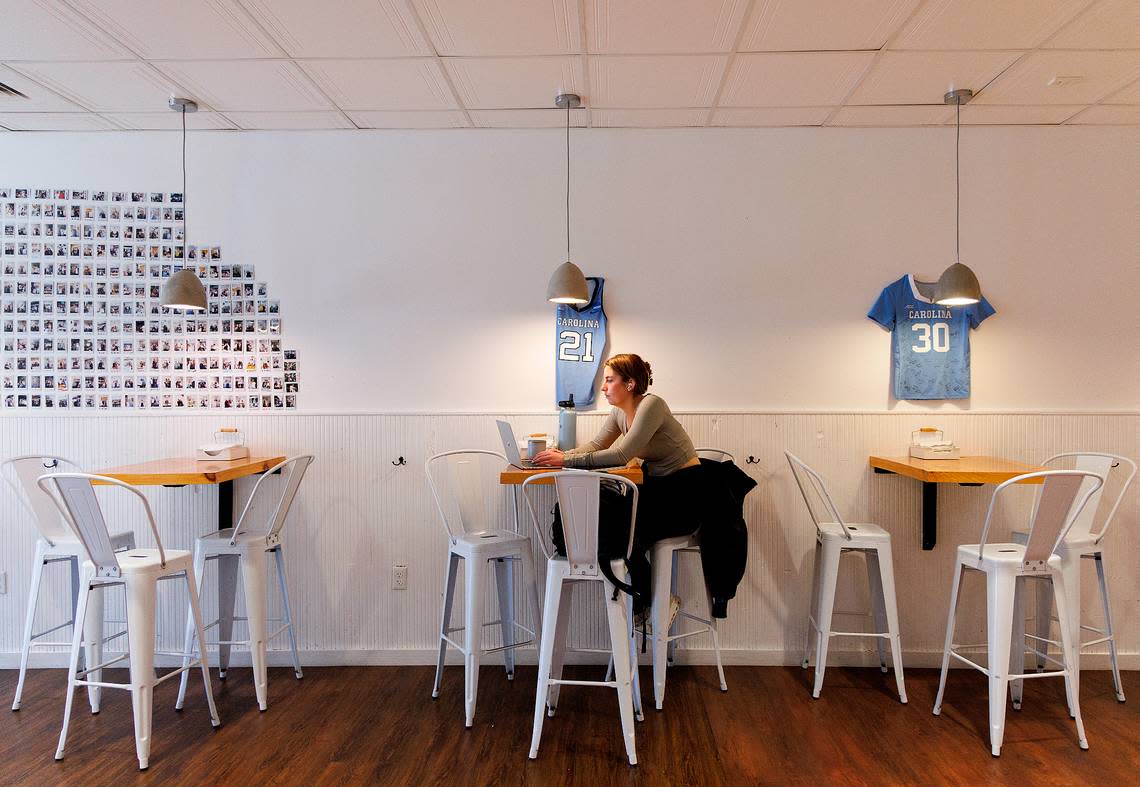
In November, the Town Council voted down a 12-story building on neighboring Rosemary Street that would have set aside 25% of its apartments at a rate below the median income level — or 14 units in all. Developers touted it for adding much-needed density without replacing any historic property.
But the term “soulless high-rise” came up in discussion, and many around Chapel Hill would consider long-gone Bub O’Malley’s bar to have legitimate history — especially those who danced on tables there when the Tar Heels men’s basketball team won the National Championship in 1993.
Opponents called for Chapel Hill to keep a place for its quirkiness and value its grit — the hallmarks of any college town.
“I know I don’t have much leverage in this situation,” said Josh Goodsell, owner of The Gathering Place, self-described as Chapel Hill’s nerdy beer bar. “I would be remiss if I didn’t tell you what was currently existing at 157 East Rosemary. It is a bit of a weird community of fun-loving people who have gotten to love the ugly old building that is there currently.”
And in that moment, he crystallized the struggle on Franklin Street: a tug-of-war between history and progress, a struggle to keep up with change without sacrificing the uniqueness that brought people’s loyalty and love.
What’s missing from Franklin Street these days? Do any UNC fan favorites remain?
How are main streets near Triangle colleges doing compared to UNC’s Franklin Street?
